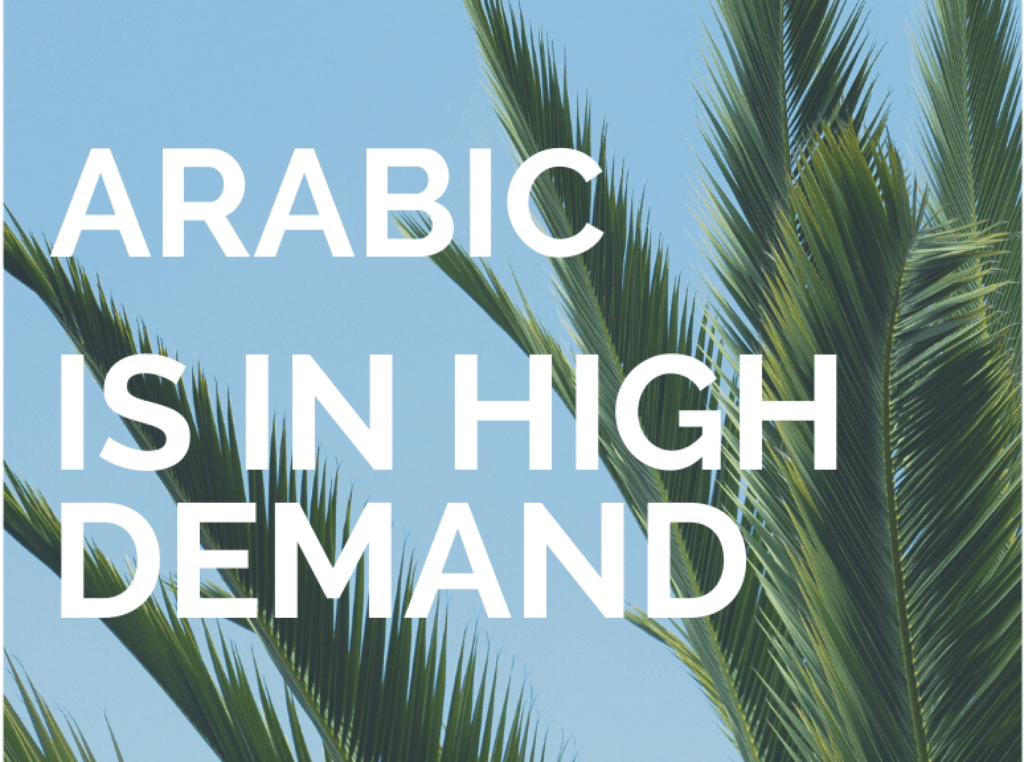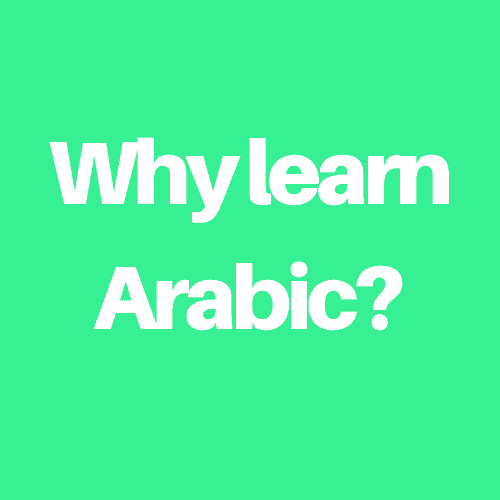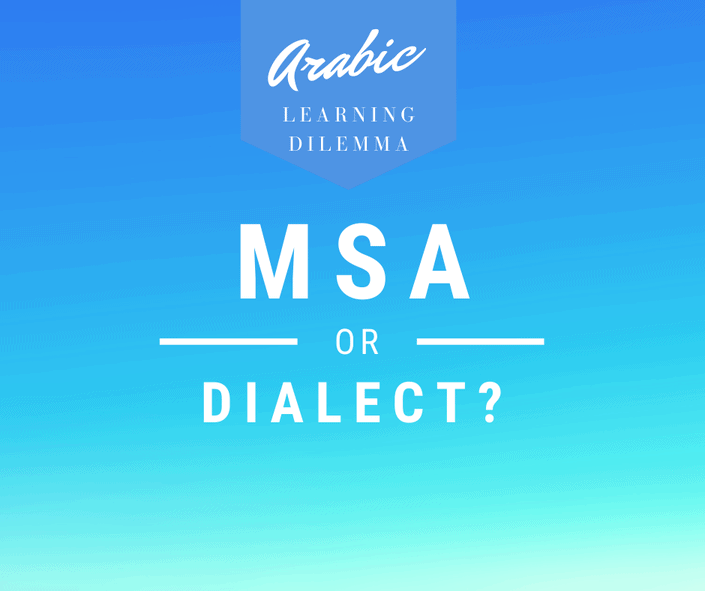There are plenty of foreign languages in the world to learn and there’s more than one reason to pick one tongue over the other. However, there are practical considerations and reasons that are supposed to go beyond personal taste or the coolness of a particular language.
The main question to ask here though is whether it is useful to learn Arabic , and why.
I’ll explain in this post why it is worth it to study Arabic and the various possibilities it can be useful in many career tracks, giving you a boost in the pay and taking you on endless possibilities.
Table of Contents
1.Arabic is one of the most spoken languages in the world.
Arabic language is one of the most spoken languages in the world with a much farther reach than what people think when they refer to Arabic speakers.
Arabic is the native tongue of over 440 million people across the Middle East and North Africa and is the official language of about 22 countries.
Arabic with its various dialects is also the first or second language of about 12 million Arab diaspora in Western Europe and North America. For instance, France is home to about five million North Africans spread across three generations.
Arabic is also the fourth top language in terms of users on the Internet after speakers of English, Chinese and Spanish, according to Internetworldstats.com (March 2020).
This number is projected to grow even higher as current Internet penetration in the Arab world is currently at only 53 percent.
And because Arabic is the liturgical language of about 1.6 billion Muslims from Morocco and Nigeria to Indonesia and the Philippines, it means millions more speak it as a second language at varying proficiency levels.
2. Arabic is a critical and powerful language.
At the turn of the new century, the world geopolitics have been shaped by several events that required a deeper understanding of the Arab and Muslim worlds. With the tragic events of 9/11, the Arab spring, the wars in the mideast and the fluctuating oil supplies, many world powers realized there is a bigger need for Arabic skills for a deeper understanding of this strategic part of the world.
Realizing the shortage of Arabic skills among its population and workforce, the US government deemed Arabic a critical language for the country’s national security, economic competitiveness and human capital.
This led the US decision-makers to create federal programs in cooperation with US universities and school systems to promote learning Arabic among its citizens.
The UK, in turn, came to a similar conclusion in the past few years. In 2016, a report by the British Council ranked Arabic as the second most important language for workers of the future after Spanish, citing economic, trade and national security reasons.
The United Nations uses Arabic as one of its six official languages, reflecting the importance of the language in international diplomacy.
What’s more, Arabic is the official language at other key international organizations such as the Arab League, the Organization of Islamic Cooperation and the African Union.
In 2016, the World Economic Forum rated Arabic as the 5th most powerful language in the world according to their Power Language Index Ranking. This rating system assigns scores to world languages based on weighted criteria of geography, economy, communication, knowledge & media and diplomacy.

Arabic came in fifth ahead of Russian, German and Portuguese and other languages.
3. Access to a booming economy and young population.
Many parts of the Arab world, particularly the Gulf region, enjoys a very high standard of living with plenty of discretionary income. This has created a huge need of skilled and unskilled workforce flocking to the region from all over the world.
While you can get by using English in the major financial hubs such as Dubai, UAE and Doha, Qatar, knowledge of Arabic can give you a significant competitive advantage as you can gain rare access to local government jobs, direct consulting and simply more connections with the host country employers and customers.
As a simple example, all flight attendants at the Emirates or Qatar Airways speak English, but if you speak or understand Arabic on top of that, you can significantly increase your chances of getting assigned the coveted private VIP flights working with two to six well-to-do passengers and making big tips instead of the constantly overbooked regular commercial flights.
This is just an example that applies to a non-sales job position. Imagine if you’re an international sales executive or a potential business partner looking for Arab customers or partners in the region.
The higher the stakes, the higher the rewards you can reap from your Arabic skills.
Another example of the growing business and employment opportunities in the Gulf region is a huge upcoming sports event in a nation with the highest individual income in the world.
Slated to host the soccer World Cup in 2022, Qatar is building new infrastructure of hospitals, hotels, stadiums and other facilities from scratch, pumping billions of dollars in the process.
The country relies almost completely on foreign skilled and unskilled labor to help with building the new infrastructure. Non-Qataris make up 90% of the active workforce.
More paid and unpaid opportunities will become available during the World
Cup for bilingual volunteers who speak English and Arabic.
Whereas the oil-rich Gulf countries enjoy healthy economies, other parts of the Arab world are witnessing a young population boom and growing economies. According to a medium variant projection by a UN-affiliated entity, the Arab world will have 598 million inhabitants by 2050, which makes for a population growth by two thirds from its numbers in 2010 at 239 millions.
Additionally, The population of Arab youths under 25 comprises about 53 percent of the total Arab world population.
4. Abundance of scholarships and study-abroad programs.
In the US, for instance, this has led to a series of programs and initiatives to increase Arabic language skills in the country. This means that American citizens who want to learn Arabic can qualify for an array of federal scholarships, providing opportunities to study it in college, overseas or as part of continued education track online.
Governments offer incentives to its citizens to learn Arabic to feel language needs
Unbeknownst to many, some wealthy Arab Gulf nations view Arabic language as a vehicle for mutual understanding in their relationship with the Western world. Qatar foundation, for example, supports Arabic teaching and learning in the US, UK and other counties by training Arabic teachers, funding language training programs in public schools and offering study-abroad programs for high school and university students interested in learning Modern Standard Arabic.
Starttalk is a federal grant program that supports teacher professional development, student language learning, and instructional resource development for critical less commonly taught languages in the United States such as Arabic
The US department of state offers Critical Language Scholarship , an intensive overseas Arabic language and cultural immersion program for American students enrolled at U.S. colleges and universities.
American High school students can also benefit from a similar program. The National Security Language Initiative for Youth (NSLI-Y) program provides merit-based scholarships for eligible high school students to learn less commonly taught languages such as Arabic. Participants spend a summer or academic year studying a language while immersed in the culture and day-to-day life of the host country
This simply means there is a low-entry for high-reward as an investment in your future. There are tons of ways to learn Arabic for very low or no tuition at all. You just need to look in the right places.
5. Arabic is simply in high demand.

According to a study published by the World Economic Forum,( Research ) speaking additional languages significantly boosts your earning power even when you don’t end up using your second language for work.
One explanation to this interesting fact was that employers interpret knowing a second language as an indicator of your cognitive power, work ethic and simply a good education.
Now, imagine what learning a critical language such as Arabic can do for your professional career and potential income.
Due to emerging migration trends in the last few decades, there has been a growing Arabic-speaking population in Western Europe and North America. This has created a surge in need for Arabic skills in the social, education, health and other public sectors. This trend will only rise as the flow of Arab-speaking refugees and immigrants continues.
In a globalized world, one can imagine the growing need for Arabic language talent for professionals who work in international organizations, corporations , health sector, tourism, trade , diplomacy, education and academic and scientific research.
Similarly, the growing need for legal Arabic translation, localization and interpretation services is bound to continue. The U.S. Bureau of Labor Statistics, for instance, predicts the need for Arabic translators and interpreters to hover around 30% in the period ranging from 2014 and 2024.
In the technology sector, Silicon valley and Artificial intelligence giants are eyeing an untapped Arabic-speaking market that exceeds 400 million consumers. They are currently engaged in a race to produce language solutions to Arabic speakers, generating a dire need for data analysts, coders and project managers with Arabic language skills.
If Natural Language Processing of English and other Western languages is in its infancy, one can say that it is still in its embryonic phase for the Arabic language.
As a result, big tech giants like Amazon, Facebook and Microsoft are hiring technology talents with Arabic language skills to help develop automated Arabic language solutions for the future. It suffices to say that Alexa and Siri still cannot yet speak Arabic.
In its own words, The United Nations pride itself as the world’s largest employer of language professionals. Several hundred language professionals work for the Department for General Assembly and Conference Management (DGACM) in their offices in New York, Geneva, Vienna and Nairobi. Many more are hired by the regional commissions of the United Nations in Addis Ababa, Bangkok, Beirut and Santiago.
UN language employees enjoy a great benefits package, work-life balance and mobility to work in different world capitals.
At the United Nations, the term “language professional” applies to an array of specialized and related occupational roles that include mainly interpreters, translators, editors, verbatim reporters, terminologists, reference assistants, copy preparers and proofreaders.
What’s more, knowledge of Arabic is definitely key in the business world, especially in sectors like energy, infrastructure, technology and real estate. These have boosted business and employment opportunities in the oil producing countries like Saudi Arabia and the UAE , which have Arabic as their official language.
If you have knowledge of Arabic in a professional environment, you’ll most likely be highly in demand for companies and entities that conduct business in that region.
The same could be said for diplomatic, governmental and political careers that deal with policy in the Arab world.
6. Arabic is a gateway to other languages in the region.

For learners with professional or academic interests in other non-Arab countries in the Middle East, Arabic can be their language gateway to non-Arabic languages.
There are languages that share similar or identical script and morphology, such as Urdu, Farsi, Kashmiri and Dari. These languages share plenty of common vocabulary as well.
Arabic is a semitic language and shares a lot of root words with Hebrew , Aramaic and Syriac.
Although Turkish uses a romanized script , it shares a significant amount of vocabulary and phonetically is quite similar to Arabic.
A few people know that Maltese , for instance, comprises about 60% Maghrebi Arabic and 40% Italian. It is a language that’s quite easy to pick up if you are familiar with Arabic in general and Maghrebi dialect in particular.
7. Access to the rich Islamic and Arab culture.
The Arab world stretches over large parts of Africa and Asia. Its location at the intersection of three continents contributed to a rich history and access to varying cultures and civilizations. As you travel across the Arab world, you can notice the European, Turkish, Jewish, Persian, African, Andalusian and Berber influences reflected in food, clothes, history, lifestyle and other aspects of life.
I strongly reading Understanding Arabs for any learner of Arabic or anyone interested academically or personally in the Arab world in order to gain a fundamental understanding of the culture.
The 22 Arab nations combined have a total area of over 5 million square miles. They boast a diverse population, dialects and traditions. However, they are all unified under Modern Standard Arabic, which is the official language throughout these countries.
Arabic is the language of Islam. If you’re traveling to any part of the Islamic world, your knowledge of Arabic will come very handy because you will encounter people who speak Arabic there even if it is an Arabic-speaking country.
Knowledge of Modern Standard Arabic will give you access to hundreds of millions of speakers around the globe and a wide array of Arabic text and related materials.
Another category of learn with whom this point reverbates more than anybody else is that of Muslims whose native tongue is not Arabic. Their quest to understand Arabic goes far beyond learning to read Quran. If you are one of them you know very well how much you want to explore about the birthplace of Islam and gave direct access to Islamic scriptures.
Conclusion
So, as we have covered above, there are plenty of good reasons to consider learning Arabic whether for professional or personal growth.
A large segment of the world population speaks it. Arabic enjoys a rising profile on the world scene, making it quite in demand in the job market whether you are a language professional or pursue other professions that can benefit greatly from the Arabic skills.
There is no downside to learning Arabic as a language , particularly in this day and age where the internet made things a lot easier.






